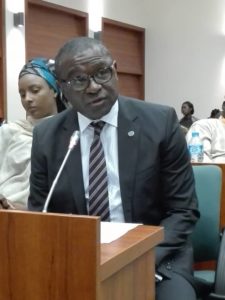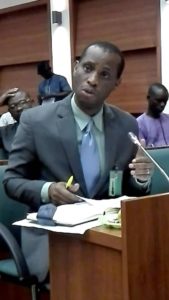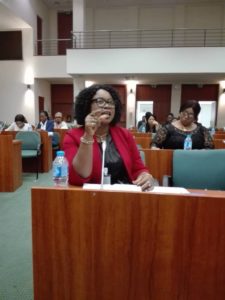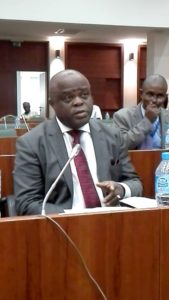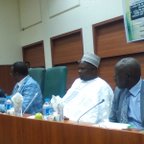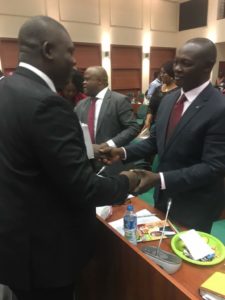 Downloads
Downloads
Ten Years Later, Ugandan Court Finally Confirms 93 Charges…
On August 30, 2018 the International Crimes Division (ICD) of the High Court in Kampala finally confirmed 93 charges against former Lord’s Resistance Army (LRA) commander Thomas Kwoyelo, who has been in detention since 2008.
For Kwoyelo, the wheels of justice have undoubtedly been slowed by numerous delays in his trial. Following his capture in 2008, Kwoyelo first appeared before the ICD in 2011. The start of his trial was delayed due to a preliminary objection raised by his defense lawyers who argued that he was entitled to amnesty under Uganda’s amnesty law,which was valid at the time of his capture. This matter was not settled until 2015, when Uganda’s Supreme Court ruled that Kwoyelo’s trial was constitutional and did not breach Uganda’s amnesty law.
In 2016, three pre-trial hearings were held in April, August, and September, while in 2017, four pre-trial hearings were held in January, February, March, and July. While these pre-trial hearings were meant to pave the way for the confirmation of the charges against Kwoyelo, they instead created legal challenges that further stalled the trial. At one point, Kwoyelo’s defense counsel labelled the charges as “fatally and incurably defective,” arguing that the conflict in Uganda was largely domestic, and the prosecution cannot therefore charge Kwoyelo under international criminal law.
Other factors that caused delays included objections by the defense that Kwoyelo was not medically fit to stand trial, a delay in translation of the charge sheet and other documents into the Acholi language, and a disagreement between the defense and the prosecution over redaction and delayed disclosure of evidence.
On a very disappointing note, the court and the different legal entities involved are also to blame. On numerous occasions, court officials failed to show up at scheduled trials. In July 2017 for example, a hearing failed to take place when neither the judge, the prosecution, nor the defense lawyers showed up for the proceedings. In June 2018, a hearing had to be postponed yet again due to lack of quorum by the defense lawyers. On this occasion, the judge warned that it would be the last adjournment, while Kwoyelo expressed anger at the slow pace of the proceedings. In July 2018, another hearing failed to take place when the judiciary cited lack of funds. This was the third postponement in a row and left uncertainty about whether the charges against Kwoyelo would be confirmed.
The confirmation of charges therefore comes as relief to Kwoyelo and many other stakeholders who have waited a long time for the trial to move forward. At the hearing on August 30, 2018, proceedings progressed smoothly, after a few preliminary objections raised by the defense.
Kowyelo’s defense told court that they were not ready to proceed because the charge sheet had not been translated into Luo as earlier ordered by court. The defense argued that in the interest of justice and for Kwoyelo to understand the charges against him, the charge sheet needed to be translated. Kwoyelo’s court appointed lawyers also noted that they had not been given any funds by the court.
In response to the defense’s objections, Justice Susan Okalany, the presiding judge, expressed disappointment that the charge sheet had not been translated, and that the lawyers had not been given funds to prepare for the trial. She thus ordered the court registrar to follow up and rectify the issues.
The judge nevertheless noted that the defense’s concerns could not bar her from delivering the court’s ruling. In her opinion, Kwoyelo was sufficiently aware of the charges against him despite the charge sheet having not been translated.
The judge recapped the charges against Kwoyelo, noting that they include war crimes and crimes against humanity as spelled out under customary international law and the Ugandan penal code act. The charges include torture, cruel treatment, outrages upon personal dignity, pillage, murder, and rape, among others.
The judge noted that there was need for the court to establish whether there was sufficient evidence to proceed to the main trial. She thus held that the court had a responsibility to establish whether there was sufficient evidence to sustain each of the charges and enough to prove that Kwoyelo actually committed the offences he is charged with. She also noted that the prosecution would have to establish whether there was a widespread and systematic attack on the civilian population, the exact attacks, and the knowledge of the accused about the attacks. The judge then proceeded to confirm the charges against Kwoyelo.
“The Court has established elements of the said offences to required standards for purposes of confirmation. The Court has found the evidence sufficient to commit the accused for trial and he will be informed of the date,” said Justice Okalany.
The ICD has already announced that justices Moses Mukiibi, Duncan Gaswaga, and Micheal Elubu will hear Kwoyelo’s case at the trial stage. With the charges against him having been finally confirmed, the stage has now been set for the main trial.
SOURCE : International Justice Monitor
